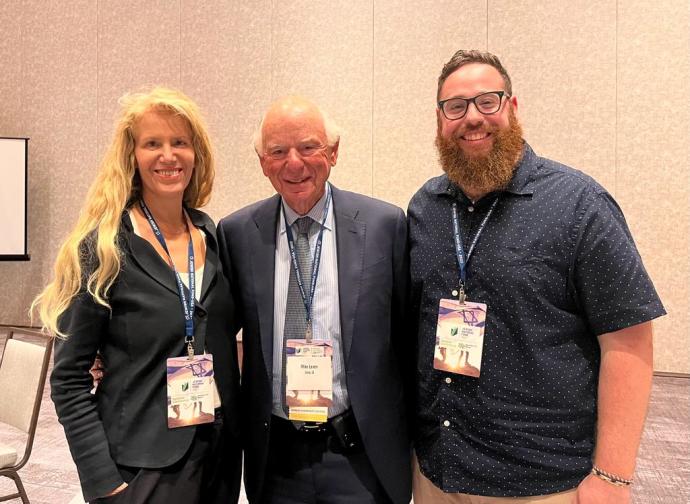It’s a long way from Wichita, Kansas, to New York City, the headquarters of the Jewish Federations of North America. Yet, Julie Platt, chair of the Board of Trustees of JFNA, says that growing up in a small Jewish community in middle America played a vital role in developing the Jewish leadership skills that have served her throughout her career.
“From birth, Jewish ritual practice and education were part of my life,” says Platt, who, in June 2022, became the second woman in the history of the Jewish Federations to serve as board chair. “I grew up in Wichita, a city with a very small Jewish population, and my parents went about creating a very rich Jewish life in a very small community.
It was augmented by a fantastic and transformational experience in Jewish summer camp at Camp Ramah, but my life was rich and full, not only in terms of what a Jewish home can be like but also watching my parents take on leadership role after leadership role locally and nationally.”

Before assuming her current position at JFNA, Platt served as chair of the Jewish Federation of Greater Los Angeles and chair of the Foundation for Jewish Camp, where she was instrumental in helping Jewish camps survive during the pandemic. Throughout her career, Platt has distinguished herself as a dedicated and devoted Jewish leader, examining not only the Jewish present but keeping an eye on the future as well. It is for this reason that she is a member of the Advisory Board of the Jewish Future Pledge and a signatory to the pledge.
The Jewish Future Pledge is a worldwide movement created by Mike Leven, a business executive and philanthropist. It inspires Jews of all backgrounds to commit that at their passing, at least half of the charitable funds that they leave will be earmarked to support the Jewish people and/or the State of Israel.

The pledge is modeled after the Giving Pledge, a 2010 initiative in which 40 of America’s wealthiest people, including Warren Buffett, Bill Gates and Melinda French Gates, committed to give the majority of their wealth to address society’s most pressing problems. Unlike the Giving Pledge, which targeted only the most affluent, the Jewish Future Pledge is intended for all members of the Jewish community and its non-Jewish allies.
The Jewish Future Pledge is far more than a fundraising scheme. As part of arranging the pledge, parents speak to their children and grandchildren about the Jewish values that have guided their lives and the importance of sustaining the Jewish people. These conversations are key for fostering engagement and support for the organizations that will carry on the Jewish tradition in the future.
‘We want to create a community-wide conversation about why ensuring the Jewish people matters’
Platt concurs, saying, “I’ve devoted my life to the Jewish future, to Jewish continuity and to making sure that we have flourishing Jewish communities. I care about what the world will look like for my children and my grandchildren. The Jewish Future Pledge allows me to put in place a very strong statement to my children and my grandchildren about what I hope that future will look like.”
The Jewish Federations of North America and the Jewish Future Pledge have had a formal partnership agreement since January 2021. JFNA has tested the pledge with different communities in the JFNA universe, such as the National Young Leadership Cabinet, and National Women’s Philanthropy.
Platt says that the reaction among these groups to the Jewish Future Pledge has been very positive. “We want to create a community-wide conversation about why the Jewish future matters and why ensuring the Jewish people matters. This is a good framework for this conversation, and it allows us to support current endowment campaigns and legacy initiatives at both the national and local levels.”
Presenting the Jewish Future Pledge to different JFNA groups revealed that people are interested in engaging in an important conversation about the Jewish future, says Platt, and the Jewish Future Pledge provides people with the tools to have this type of conversation. “I think that having the opportunity to say it while you are alive, to your children and grandchildren, about what matters to you couldn’t be more important. It resonates very much with people.”
As chair of the Jewish Federations of North America, Platt says that strengthening ties between Israel and the Diaspora is one of her goals, and the Jewish Future Pledge embodies the overall desire to help Jews around the world.
“If you care about a Jewish future, then you care about a Jewish future around this country and around the globe. Signing the Jewish Future Pledge says ‘I care about a Jewish future everywhere as a whole.’”
Platt also wholeheartedly supports the Jewish Youth Pledge, a special initiative that asks Jewish teenagers and young adults – ages 13 to 24 – to commit to being active, contributing members of the Jewish community throughout their lives. The Jewish Youth Pledge helps teens engage with their Jewish heritage and their role in the Jewish community through a pre-planned lesson, which includes videos and discussion prompts.
After completing the assignment, they are asked to write a letter on their smartphone or tablet to their future selves, answering questions such as “If you could meet yourself in the future, what would you hope to hear that you had accomplished or contributed?” The letter is stored in a secure Digital Time Capsule and shared with participants at key junctures throughout the next two decades of their lives.
‘Signing the Jewish Future Pledge says “I care about a Jewish future everywhere”’
Participants will be reminded of their commitment every five years, for the next 20 years, via a text message containing their full letter. It will remind them at various stages of their lives about the goals and aspirations they wrote as teens.
“I think an intentional reminder of who we are and what matters is important at every age, not just the bar/bat mitzvah child. Intentionally making yourself stop and think about who you are and what you are doing is important,” Platt says.
In Platt’s view, encouraging bar/bat mitzvah-age children to begin thinking about their responsibilities as Jewish citizens is important. “It is not too early,” she says. “In just about every bar/bat mitzvah training program that I know of, children are asked about their community service project or their philanthropy project.
“If those are the kinds of thoughts they are asked to have at age 12 or 13, they ought to be thinking about what it looks like to be a responsible member of the Jewish community. That can only bode well for the future and for their place in line with their parents and grandparents. It makes young adults become cognizant of who they are, and I think that’s a good thing.”
Platt, a mother of five children, says that she and her husband began discussing the idea of philanthropy and responsibility to the Jewish community when her children were still young. “As soon as you can read, and as soon as you know firmly that you’re Jewish, it’s not too early to begin to think about what it means to be generous. The Jewish Future Pledge is a wonderful idea to help people learn about tzedakah (charity) and being generous.”
Today, with the rise of antisemitism around the world, Platt suggests that the Jewish Future Pledge and the Jewish Youth Pledge can play a pivotal role in helping Jews feel positive and even joyous about their Judaism.
“We have to be proudly Jewish,” she says. “To allow someone to make a statement in this way that says ‘I’m Jewish, and I’m proud of it’ is a good thing. It is empowering and very optimistic. Signing the pledge represents a commitment and belief in a Jewish future. I think it’s a really empowering statement to say that you believe that the generations that come will also be living proudly Jewish and talking about the Jewish future.”
From her position as chair of JFNA, Platt has seen that current world events have galvanized the Jewish community into action in the past year. “For better or for worse, the global Jewish community has become very activated because we have done some magnificent things in Ukraine and Russia to answer where we weren’t always empowered to be able to answer.”
Mentioning a recent speech that she delivered, she says, “I was so happy to be able to say that there isn’t a Jew who needs to get out of harm’s way that we can’t help. We couldn’t always say that. I think we are very activated, and it is the right time to be really leaning into the Jewish Future Pledge.”
This article was written in cooperation with the Jewish Future Pledge and the Jewish Youth Pledge.
